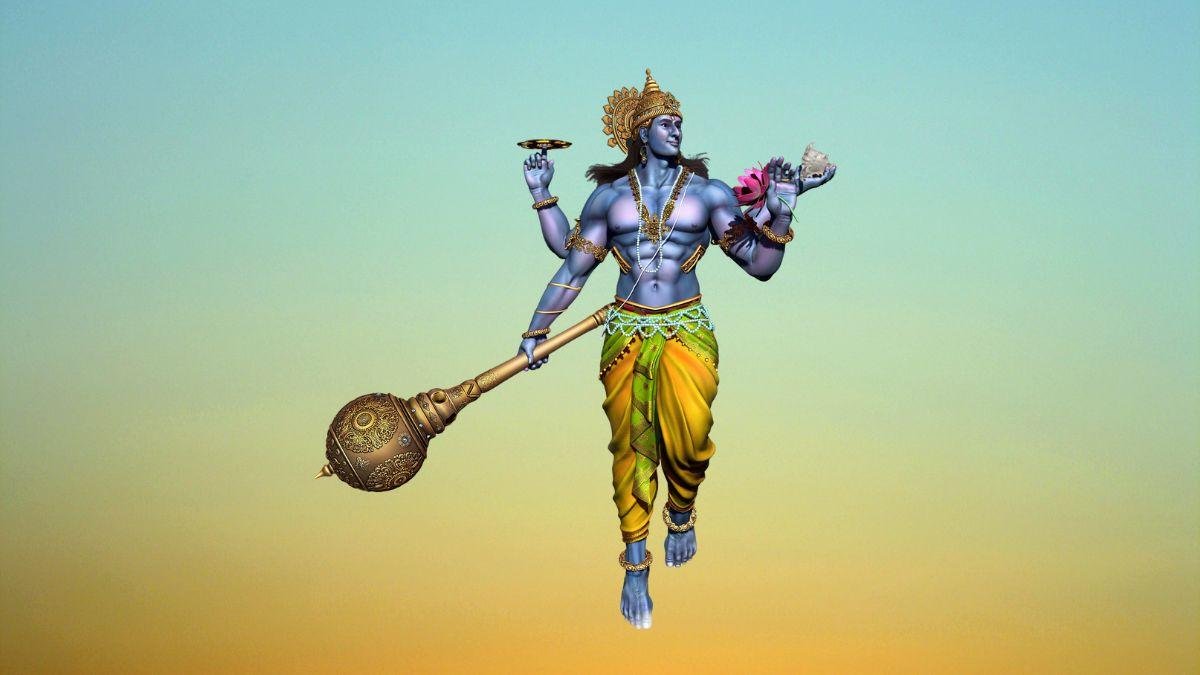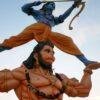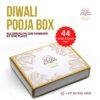Nirjala Ekadashi has great significance among Hindus in India and throughout the world. Nirjala Ekadashi is considered to be the most auspicious day. There is a total of 24 Ekadashi’s, which are being observed in a year. Nirjala Ekadashi is considered to be one of the most important Ekadashi. According to the Drik Panchang, Nirjala Ekadashi will be observed on the 11th day of Shukla Paksha in the month of Jyeshtha. This year, it is going to be celebrated on Friday, 10th June 2022.
Nirjala Ekadashi vrat observed by devotees on this day is noted for its ascetic fasting and rigorous austerities. The word ‘nir-jala’ means ‘without water’; therefore the fasting on this Ekadashi is observed without drinking water and eating food. Nirjala Ekadashi is the toughest and most sacred of all Ekadashi.
Why Nirjala Ekadashi is observed?
According to the Hindu Scriptures, Nirjala Ekadashi is known as Bhima Ekadashi or Pandava Ekadashi. Once Bhima wanted to observe Ekadashi fast to offer prayers to Lord Vishnu but he had no control over his hunger, while his brothers used to keep all Ekadashi fast. Bhima approached sage Vyas ji (who was the creator of Mahabharata Scripture) to seek a solution for his inability to observe all Ekadashi fast. Sage Vyas advised Bhima to observe the Nirjala Ekadashi fast as by observing Nirjala Ekadashi fast alone, Bhima could get rid of his guilt of not observing all Ekadashi fast. Sage Vyas told him that Nirjala Ekadashi is observed once a year and he would derive the advantages of all the other Ekadashis by observing only Nirjala Ekadashi fast.
Significance of Nirjala Ekadashi
Ekadashi is considered to be the most sacred day and Nirjala Ekadashi means the strict fast, which is observed without water. Most of the devotees observe this fast without taking even a drop of water or food throughout the day and night i.e. for 24 hours. Though it is very hard to observe Nirjala Ekadashi Fast, a large number of Hindu devotees eagerly wait for Nirjala Ekadashi fast. It is believed that anyone, who observes this sacred Jyeshtha Shukla Nirjala Ekadashi fast, is able to get rid of all the sins, bad acts and deeds of his past life and achieve the liberation from the cycle of birth and death and can attain salvation.
Nirjala Ekadashi Mahurat (UAE)
Nirjala Ekadashi on Friday, June 10, 2022
On 11th Jun, Parana Time – 01:41 PM to 04:25 PM
On Parana Day Hari Vasara End Moment – 09:39 AM
Ekadashi Tithi Begins – 05:55 AM on Jun 10, 2022
Ekadashi Tithi Ends – 04:15 AM on Jun 11, 2022
Nirjala Ekadashi Parana
Gauna Nirjala Ekadashi on Saturday, June 11, 2022
On 12th Jun, Parana Time for Gauna Ekadashi – 05:29 AM to 08:13 AM
On Parana Day Dwadashi would be over before Sunrise
Ekadashi Tithi Begins – 05:55 AM on Jun 10, 2022
Ekadashi Tithi Ends – 04:15 AM on Jun 11, 2022
*UAE Time
Rituals of Nirjala Ekadashi
As the name suggests, the Nirjala Ekadashi fast should be observed without drinking even a drop of water. Hence this vrat is most strict and sacred. The Nirjala Ekadashi fast lasts for 24 hours, starting from sunrise of the Ekadashi tithi to the sunrise of the Dwadashi tithi.
On the Nirjala Ekadashi day, Bhagwan Vishnu is worshipped with full dedication. Devotees offer Tulsi leaves, flowers, fruits and mouth-watering sweets to their lord. The idol of Bhagwan Vishnu is beautifully adorned and worshipped in the evening with dhoop and incense sticks.
The observer of the Nirjala Ekadashi vrat should stay awake all night and therefore they visit Bhagwan Vishnu temples to participate in the bhajans and kirtans, organized for this occasion.
Reading ‘Vishnu Sahastranaam’ and other Vedic mantras dedicated to Bhagwan Vishnu is considered auspicious on this day.
Nirjala Ekadashi mantra
“Om Namo Bhagavate Vasudevaya”
Meaning: I offer my obeisance to or bow down to Lord Vasudeva or Lord Krishna.
Nirjala Ekadashi Do’s and Dont’s
What to do?
- Wake up early (preferably during Brahma Muhurat – precisely two hours before sunrise)
- Take a bath and wear fresh clothes
- Maintain celibacy
- Do Dhyana (meditation) and chant the OM Namo Bhagavatae Vasudevaya Mantra
- Prepare a sweet dish (payasam or sheera). Add Tulsi leaves while offering it as Naivedhya.
- Help the poor, donate food, water or other essentials.
- Do good deeds.
What not to do?
- Nirjala Ekadashi Vrat is the toughest because devotees keep a 24-hour long fast without consuming food and water. Therefore, only those who are physically fit and determined should observe the fast. Most importantly, those with medical conditions should refrain from fasting to avoid health complications.
- Though one must keep an absolute fast, many devotees observe a fast from sunrise to sunset. Therefore, you may consume a meal in the evening but avoid eating wheat, rice, and lentils.
- Do not lie or use derogatory language.
- Do not harm anyone by deeds or actions.
Nirjala Ekadashi Story in English
Once Bhimasena, the younger brother of Maharaja Yudhisthira, asked the great sage Srila Vyasadeva, the grandfather of the Pandavas if it is possible to return to the spiritual world without having observed all the rules and regulations the Ekadasi fasts. Bhimasena said, “O greatly intelligent grandfather, my brother Yudhisthira, my dear mother Kunti, and my beloved wife Draupadi, as well as Arjuna, Nakula, and Sahadeva fast completely on Ekadasi and strictly follow all the rules and regulations of that sacred day. Being very religious, they always tell me that I should also fast on that day. But, O grandfather, I tell them that I cannot live without eating because hunger is unbearable to me. I give widely in charity and worship Sri Keshava properly, but I cannot fast on Ekadasi Please tell me how I can obtain the same result without fasting.”
Hearing these words, Srila Vyasadeva replied, “If you want to go to the heavenly planets and avoid the hellish planets, you should indeed observe a fast on both the light and dark Ekadasis.” Bhima said, “O greatly intelligent grandfather, please listen to my plea. O greatest of munis, since I cannot live if I eat only once a day, how can I possibly live if I fast completely? Within my stomach burns a special fire named vrka, the fire of digestion.’ Only when I eat to my full satisfaction does the fire in my stomach become satisfied. O great sage, I might possibly be able to fast only once, so I beg you to tell me of an Ekadasi that includes all other Ekadasis. I shall faithfully observe that fast and hopefully still become eligible for liberation.”
Srila Vyasadeva replied, “O king, you have heard from me about the various kinds of occupational duties, such as elaborate Vedic ceremonies. In the Kali-yuga, however, no one will be able to observe all these occupational duties properly. I shall therefore tell you how, at practically no expense, one can endure some small austerity and achieve the greatest benefit and resultant happiness. The essence of what is written in the Vedic literature known as the Puranas is that one should not eat on either the dark- or light-fortnight Ekadasis. One who fasts on Ekadasi is saved from going to the hellish planets.”Hearing Vyasadeva’s words, Bhimasena, the strongest of all warriors, became frightened and began to shake like a leaf on a banyan tree in a strong wind. The frightened Bhimasena said, “O grandfather, what should I do? I am completely unable to fast twice a month throughout the year! Please tell me of the one fasting day that will bestow the greatest benefit upon me!”
Vyasadeva replied, “Without drinking even water, you should fast on the Ekadasi that occurs during the light fortnight of the month of Jyestha [May-June], when the sun travels in the sign of Gemini and Taurus. According to learned personalities, on this day one may bathe and perform acamana for purification. But while performing acamana one may drink only that amount of water equal to a drop of gold, or that amount in which a single mustard seed can be immersed in. Only this amount of water should be placed in the palm, which one should form to resemble a cow’s ear. If one drinks more water than this, he might as well have drunk wine.”One must certainly not eat anything, for if he does so he breaks his fast. This rigid fast is in effect from sunrise on Ekadasi to sunrise on Dvadasi. If a person endeavours to observe this great fast very strictly, he easily achieves the results of observing all twenty-four Ekadasi fasts throughout the entire year.
“On Dvadasi. the devotee should bathe early in the morning. Then, according to the prescribed rules and regulations, and depending on his ability, he should give some gold and water to worthy Brahmanas. Finally, he should cheerfully honour prasadam with a brahmana.
“O Bhimasena, one who can fast on this special Ekadasi in this way reaps the benefit of having fasted on every Ekadasi during the year. There is no doubt of this. O Bhima, now hear the specific merit one gets by fasting on this Ekadasi. The Supreme Lord Kesava, who holds a conch, disc, club, and lotus, personally told me, ‘Everyone should take shelter of Me and follow My instructions.’ Then He told me that one who fasts on this Ekadasi. without drinking water or eating, becomes free of all sinful reactions, and that one who observes the difficult nirjala fast on Jyestha-sukla Ekadasi. truly reaps the benefit of all other Ekadasi fasts.
“O Bhimasena, in the Kali-yuga, the age of quarrel and hypocrisy, when all the principles of the Vedas will have been destroyed or greatly minimized, and when there will be no proper charity or observance of the ancient Vedic principles and ceremonies, how will there be any means of purifying the self? But there is the opportunity to fast on Ekadasi and become free of all one’s past sins.
“O son of Vayu, what more can I say to you? You should not eat during the dark and light Ekadasis, and you should even give up drinking water on the particularly auspicious day of Jyestha-sukla Ekadasi. O Vrkodara, whoever fasts on this Ekadasi receives the merits of bathing in all the places of pilgrimage, giving all kinds of charities, and fasting on all the dark and light Ekadasis, Of this, there is no doubt. O tiger among men, whoever fasts on this Ekadasi. truly becomes a great person and achieves all wealth, grains, strength, and health. And at the fearful moment of death, the terrible Yamadutas, whose complexions are yellow and black and who brandish huge clubs and twirl mystic pass ropes in the air, will refuse to approach him. Rather, such a faithful soul will at once be taken to the supreme abode of Lord Visnu by the Visnudutas, whose transcendentally beautiful forms are clothed in gorgeous yellowish garments and who each hold a disk, club, conch, and lotus in their four hands. It is to gain all these benefits that one should certainly fast on this very important Ekadasi, even from water.”
When the other Pandavas heard about the benefits to be gained by following Jyestha-sukla Ekadasi. they resolved to observe it exactly as Srila Vyasadeva had explained it to their brother, Bhimasena. All the Pandavas observed it by refraining from eating or drinking anything, and thus this day is known as Pandavanirjala Dvadagi.
Srila Vyasadeva continued, “O Bhima, therefore you should observe this important fast to remove all your past sinful reactions. You should pray to the Supreme Personality of Godhead, Lord Sri Krsna, in this way: ‘O Lord of all the demigods, O Supreme Personality of Godhead, today I shall observe Ekadasi without taking any water. O unlimited Ananta, I shall break fast on the next day, Dvadasi.’ Thereafter, to remove all his sins, the devotee should honour this Ekadasi fast with full faith in the Lord and with full control of his senses. Whether his sins are equal in volume to Mount Sumeru or to Mandaracala Hill, if he or she observes this Ekadasi, the sins all become nullified and are burned to ashes. Such is the great power of this Ekadasi.
“O best of human beings, although a person should also give water and cows in charity during this Ekadasi if for some reason or other he cannot, then he should give a qualified brahmana some cloth or a pot filled with water. Indeed, the merit achieved by giving water alone equals that gained by giving gold ten million times a day.
“O Bhima, Lord Sri Krsna has said that whoever observes this Ekadasi should take a holy bath, give charity to a worthy person, chant the Lord’s holy names on a japa-mala, and perform some kind of recommended sacrifice, for by doing these things on this day one receives imperishable benefits. There is no need to perform any other kind of religious duty. Observance of this Ekadasi fast alone promotes one to the supreme abode of Sri Visnu. O best of the Kurus, if one donates gold, cloth, or anything else on this day, the merit one obtains is imperishable.
“Remember, whoever eats any grains on Ekadasi becomes contaminated by sin and verily eats only sin. In effect, he has already become a dog eater, and after death, he suffers a hellish existence. But he who observes this sacred Jyestha-sukla Ekadasi and gives something in charity certainly achieves liberation from the cycle of repeated birth and death and attains the supreme abode. Observing this Ekadasi, which is merged with Dvadasi, frees one from the horrible sin of killing a brahmana, drinking liquor and wine, becoming envious of one’s spiritual master and ignoring his instructions, and continually telling lies.
Srila Vyasadeva concluded, “I strongly urge you to fast on this auspicious, purifying, sin-devouring Dvadasi in just the way I have outlined. Thus you will be completely freed of all sins and reach the supreme abode.”



















Add comment